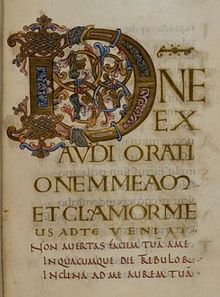| Psalm 102 | |
|---|---|
| "Hear my prayer, O LORD" | |
| Penitentiary psalm | |
 Beginning of the psalm in the Ramsey Psalter, with illuminated initial | |
| Other name |
|
| Language | Hebrew (original) |
Psalm 102 is the 102nd psalm of the Book of Psalms, beginning in English in the King James Version: "Hear my prayer, O LORD, and let my cry come unto thee." In Latin, it is known as "Domine exaudi orationem meam".[1][2]
In the slightly different numbering system used by the Greek Septuagint version of the bible and the Latin Vulgate, this psalm is Psalm 101.
This psalm is part of the fourth of the five biblical books of Psalms[3] and is one of the seven penitential psalms. It begins the final section of the three traditional divisions of the Latin psalms, and for this reason the first words ("Domine exaudi orationem meam et clamor meus ad te veniat...") and above all the initial "D" are often greatly enlarged in illuminated manuscript psalters, following the pattern of the Beatus initials at the start of Psalm 1.[4] In the original Hebrew, the first verse introduces the psalm as "A prayer of the poor man" or "A prayer of the afflicted". The New King James Version has a longer sub-title, "A Prayer of the afflicted, when he is overwhelmed and pours out his complaint before the Lord."[5]
- ^ Parallel Latin/English Psalter / Psalmus 101 (102 Archived 2017-05-07 at the Wayback Machine medievalist.net
- ^ "Comparison of Enumeration of the Psalms in the Book of Divine Worship and in the Vulgate". The Daily Office of the Catholic Church According to the Anglican Use. Retrieved 7 November 2018.
- ^ "Bible Commentary / Produced by TOW Project". Theology of Work. Retrieved 10 November 2018.
- ^ Calkins, Robert G. Illuminated Books of the Middle Ages, p. 208, 1983, Cornell University Press, ISBN 0500233756
- ^ Psalm 102